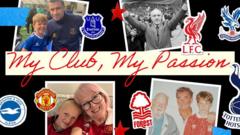What Makes Us Love Our Clubs: Gazza, Family, and a Kiss from Clough?

Why We Love Our Clubs: Stories of Passion and Loyalty
Football is more than just a game; it’s a tapestry woven with stories, emotions, and connections. For many fans, their allegiance to a particular football club is not just about the excitement of the matches, but rather an intricate web of family ties, lifelong memories, and a sense of belonging. From the thrill of childhood encounters with legendary players to the emotional support that clubs provide, the reasons behind our unwavering loyalty are as diverse as the fans themselves. This article explores the depths of this passionate relationship between supporters and their clubs, celebrating the shared identity that football fosters in an increasingly disconnected world.
The Roots of Football Loyalty
Many fans find their connection to a football club rooted in geographical proximity. Growing up near a club's stadium often makes it an integral part of one’s identity. For others, it's a family tradition passed down through generations. The stories shared by fans often highlight these connections.
For example, Ryan's tale of meeting Brian Clough, the legendary manager of Nottingham Forest, encapsulates the magic of childhood memories. His grandad, a Sheffield Wednesday fan, received a kiss from Clough, resulting in a cherished moment that transcended club loyalties. Such encounters not only create lifelong memories but also strengthen familial bonds through shared experiences.
Shared Identity and Community
The connection between fans and their clubs goes beyond mere geography or family tradition. Danielle Sarver Coombs, a researcher, emphasizes that the teams we support provide a shared identity. “It becomes a way to find a kinship, a community,” she states. This kinship is vital in a world marked by loneliness, offering fans a sense of belonging and purpose.
Clubs become safe spaces where individuals can express their emotions freely, whether in victory or defeat. Katie’s story about her son Harry illustrates this perfectly. For Harry, who is selectively mute and autistic, Everton matches provide a sanctuary where he can celebrate and connect with his “superheroes” on the pitch. This emotional sanctuary highlights how football can serve as a refuge for those navigating life's challenges.
The Power of Nostalgia
Nostalgia plays a significant role in why fans cling to their clubs. Many supporters cherish the memories of watching games with family members, often recalling the first moments that ignited their passion. Mikey's love for Tottenham Hotspur blossomed after witnessing the magic of Italia '90 and the brilliance of players like Gazza. That pivotal moment in his childhood solidified his lifelong commitment to Spurs, demonstrating how football can shape and reflect personal histories.
Moreover, the emotional highs and lows experienced throughout the seasons contribute to this nostalgia. Mikey recalls the joy of finally winning a trophy after years of disappointment, a moment that resonated deeply with fans of all ages. Such shared experiences create a bond among supporters, transforming the club into a vital part of their life story.
Life Lessons from Football
Football teaches invaluable life lessons, from resilience to camaraderie. Brett's love for Brighton & Hove Albion showcases how exciting gameplay can evoke passion and joy. His experiences watching maverick players like Julio Enciso remind us that football is not just about winning; it's also about moments of brilliance that linger in our memories.
These lessons often extend beyond the pitch. The collective spirit experienced at matches reinforces the idea of community, as noted by Mike Taylor from BBC Radio WM. For Wolves fans, the club represents more than just victories; it embodies a collective identity that unites individuals from all walks of life. In times of hardship, the unwavering support of a club can be a source of strength and unity.
Family Ties and Generational Support
Family connections play a pivotal role in the loyalty fans show towards their clubs. Marilyn's narrative about supporting Manchester United alongside her father and then passing that love onto her son speaks volumes about the generational nature of football fandom. The emotional weight of shared experiences, particularly in the face of loss, deepens the bond between family members and their club.
This generational transfer of loyalty cultivates a rich tapestry of memories and traditions. Fans often recount stories of attending matches with parents or grandparents, creating a legacy that continues through the years. This shared passion fosters a unique sense of camaraderie, linking family members through their mutual support for the club.
The Cultural Impact of Football
Football has a significant cultural impact that extends beyond the sport itself. It influences music, art, and social movements. Clubs often emerge as symbols of local culture, representing the hopes and aspirations of their communities. The stories of fans demonstrate how deeply intertwined football is with cultural identity.
For example, clubs like Liverpool FC have a rich history and a passionate fan base that extends globally. Carl’s connection to Anfield, particularly through the ashes of his grandad buried beneath the Kop, illustrates how football can become interwoven with personal and cultural narratives. The emotional resonance of such stories serves as a compelling reminder of the power of sport to shape identity.
The Future of Football Fandom
As we move forward, the landscape of football fandom continues to evolve. With advancements in technology and social media, fans can now engage with their clubs in new ways. However, the core principles of loyalty, community, and shared experiences remain unchanged. The stories collected for the 'My Club, My Passion' campaign highlight the enduring legacy of football in our lives.
While the game may change, the emotional connections forged between fans and their clubs will persist. As new generations rise to carry the torch of fandom, the rich tapestry of stories will continue to grow, reminding us why we love our clubs so dearly.
FAQs
Why do people become loyal to a specific football club?
People often develop loyalty to a football club due to geographical proximity, family traditions, memorable encounters with players, or shared experiences with friends and loved ones. These connections create a sense of belonging and identity that is hard to break.
How does football foster a sense of community among fans?
Football creates a shared identity among fans, allowing them to connect with one another through their support for a club. Matchdays, chants, and shared victories or losses bring individuals together, fostering a sense of kinship and community.
What role does nostalgia play in football fandom?
Nostalgia plays a crucial role in football fandom as it evokes memories of significant moments, such as attending matches with family members or witnessing historic games. These cherished memories often solidify a fan's loyalty and connection to their club.
How do family ties influence football loyalty?
Family ties influence football loyalty by passing down traditions and memories from one generation to the next. Shared experiences, such as attending matches together, create lasting bonds and deepen the emotional connection between family members and their club.
In conclusion, the love for a football club is a multifaceted phenomenon shaped by personal stories, community ties, and cultural influences. As we share these narratives, we realize that our passion for football is not just about the game; it's about the connections we forge and the memories we hold dear. What is your story of loyalty to your football club, and how has it shaped your identity? #FootballPassion #ClubLoyalty #CommunityThroughFootball
Published: 2025-08-08 13:40:18 | Category: sport



